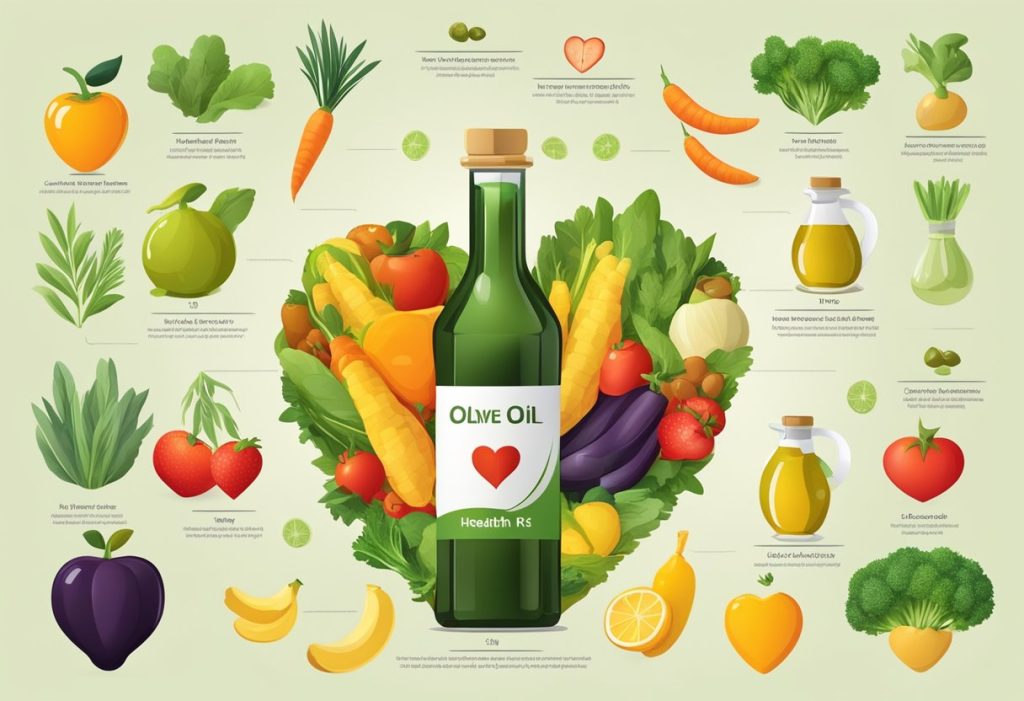Olive oil has long been lauded for its potential health benefits, emerging as a cornerstone of the Mediterranean diet, which is often associated with longevity and a reduced risk of chronic diseases. The use of olive oil in daily cuisine is more than a matter of taste; it’s a dietary choice that may have profound implications on one’s health.
Nutritional research suggests that olive oil, particularly extra-virgin olive oil, is rich in monounsaturated fats and bioactive compounds which can play a role in reducing inflammation and oxidative stress.

Understanding the relationship between olive oil consumption and disease risk reduction is crucial, as chronic diseases such as heart disease, cancer, and neurodegenerative conditions remain significant health challenges globally. A growing body of epidemiological evidence indicates that incorporating olive oil into a varied and balanced diet could be a key strategy for disease prevention.
Additionally, the dietary fats present in olive oil are considered to play a role in weight management and overall health outcomes. In light of this, olive oil is not only a staple in the kitchen for cooking and meal preparation but also an important subject of scientific review from an international perspective.
Key Takeaways
- Olive oil’s monounsaturated fats and bioactive compounds may contribute to reduced inflammation and better health.
- Integrating olive oil into a balanced diet aligns with reduced chronic disease risk and improved weight management.
- The sustained research interest underscores olive oil’s significance in nutrition and global health strategies.
Table of Contents
The Significance of Olive Oil in Nutrition
Olive oil, particularly extra virgin olive oil, is esteemed for its numerous health benefits and central role in the Mediterranean diet. Its rich composition of monounsaturated fatty acids and antioxidants like polyphenols underscores its nutritional importance.
Comparative Health Benefits of Olive Oil
Olive oil has a unique fat composition that distinguishes it from other cooking oils. It is high in monounsaturated fatty acids, which have been shown to support heart health. Studies suggest that individuals incorporating olive oil into their diets have a lower risk of heart disease. Additionally, the presence of antioxidants and polyphenols in olive oil contributes to its anti-inflammatory properties and may bolster its efficacy in reducing the risk of chronic diseases.
Nutritional Profile of Olive Oil
Extra virgin olive oil is celebrated for its complex nutritional profile. Essential fatty acids featured in olive oil are crucial to health, particularly oleic acid, known for its beneficial effects on cholesterol levels and oxidative stress. Olive oil is also a source of antioxidants, including vitamin E and polyphenols, which can help mitigate cellular damage and promote overall health.
- Oleic Acid: Approximately 55-83% of olive oil’s fatty acid content
- Polyphenols: Contribute to the stability and taste of olive oil
- Vitamin E: Acts as an antioxidant to protect body tissues
Olive Oil in the Mediterranean Diet
The Mediterranean diet is regarded for its association with longevity and reduced disease risk. Olive oil is the principal source of added fat in this diet, offering a flavorful base for a variety of dishes while contributing nutritional benefits. The dietary pattern emphasizes the consumption of plant-based foods, whole grains, and lean proteins, with olive oil enhancing the absorption of fat-soluble vitamins and providing a healthful alternative to saturated fats. Adherence to this diet has been linked to improved cardiovascular health, among other benefits.
Olive Oil and Chronic Disease Prevention
Olive oil is a cornerstone of the Mediterranean diet, known for its potential to reduce the risk of several chronic diseases. Its monounsaturated fats, antioxidants, and anti-inflammatory properties play a pivotal role in prevention and mitigation.
Impact on Cardiovascular Diseases
Olive oil has a beneficial effect on heart health. Studies indicate that its high content of monounsaturated fats can lead to a lower risk of cardiovascular disease. The antioxidant components, such as polyphenols in olive oil, help maintain the health of blood vessels by reducing oxidative stress.
Olive Oil in Cancer Prevention
The phenolic compounds present in olive oil may contribute to cancer prevention. They have been shown to initiate processes that can induce cancer cell death and inhibit the proliferation of certain cancer cells, potentially lowering the incidence of cancer.
Preventing Neurodegenerative Diseases
Regular consumption of olive oil might be linked with a reduced risk of neurodegenerative diseases, such as Alzheimer’s and Parkinson’s. The oleocanthal in olive oil has properties that could possibly protect nerve cells from damage.
Olive Oil and Metabolic Syndrome
Olive oil can play a role in preventing metabolic syndrome, which is a cluster of conditions that raises the risk for heart disease and other health problems. The oil’s beneficial fats may help improve insulin sensitivity and lower blood pressure, which are key factors in metabolic health.
Bioactive Components of Olive Oil

Olive oil is renowned for its bioactive compounds, which have been extensively researched for their potential to reduce disease risk. These components, such as antioxidants and phenolic compounds, are integral to olive oil’s health-promoting reputation.
Antioxidants and Phenolic Compounds
Olive oil contains significant amounts of antioxidants and phenolic compounds, which are instrumental in protecting the body from oxidative stress. Oxidative stress can lead to chronic diseases, including cardiovascular disease and cancer. The Mediterranean diet, which is rich in olive oil, fruits, vegetables, and whole grains, is often gluten-free and has been shown to contribute to better health, in part due to these potent antioxidants. Among the phenolic compounds, hydroxytyrosol and tyrosol have been identified as key contributors to the oil’s antioxidant capacity, reducing inflammation and potentially lowering the incidence of certain diseases.
Oleocanthal and Its Health Effects
Oleocanthal is a phenolic compound unique to olive oil that has drawn attention for its anti-inflammatory properties, similar to those of the drug ibuprofen. It is also associated with reduced risks of Alzheimer’s disease and other age-related cognitive declines. The presence of oleocanthal emphasizes the importance of choosing high-quality olive oils, such as extra-virgin olive oil, that preserve these bioactive components. Olive oil’s benefits in a gluten-free Mediterranean diet underscore its versatility not only as a culinary ingredient but also as a contributor to a healthier lifestyle.
Inflammation and Olive Oil Consumption
Olive oil, a staple of the Mediterranean diet, is recognized for its potential anti-inflammatory properties. The diet, which is often gluten-free and rich in fruits, vegetables, whole grains, and particularly olive oil, has been associated with lower inflammation levels in the body. The consumption of olive oil has been observed to impact C-reactive protein (CRP) levels, a marker commonly used to assess inflammation and cardiovascular disease risk.
Key Components:
- Monounsaturated fats: Present in olive oil, they may help reduce inflammation.
- Antioxidants: Olive oil contains compounds like polyphenols, which can modulate inflammatory processes.
Clinical studies have noted that regular intake of olive oil may lead to a decrease in inflammation markers such as CRP. This suggests that incorporating olive oil into a daily diet could have a protective effect against conditions where inflammation is a contributing factor, such as cardiovascular diseases.
Furthermore, the specific components of olive oil, such as oleocanthal, have been identified to possess anti-inflammatory abilities akin to ibuprofen, potentially contributing to the diet’s benefits in reducing the risk of chronic diseases.
Emphasizing Olive Oil in Diet:
- Use in Cooking: Replace saturated fats with olive oil for sautéing and dressing.
- Gluten-Free Options: Incorporate olive oil into gluten-free Mediterranean meals for an anti-inflammatory advantage.
In examining the relationship between olive oil and inflammation, one study found that olive oil consumption modulates inflammatory cytokines and markers related to coronary artery disease (CAD) in individuals at risk for cardiovascular diseases. These findings reinforce the role of olive oil as a beneficial inclusion in a heart-healthy diet plan.
Dietary Fats and Health Outcomes
The consumption and type of dietary fats are pivotal factors influencing health outcomes, and the choice between olive oil and other fats can have significant implications.
Olive Oil Versus Saturated Fats
Olive oil, a cornerstone of the Mediterranean diet, is predominantly made up of monounsaturated fats. Monounsaturated fats are known to be beneficial for heart health, in contrast to saturated fats, found commonly in meats and processed foods, which can contribute to cardiovascular disease when consumed in excess. The inclusion of olive oil in the diet can lead to a lower risk of heart disease. Studies suggest that replacing saturated fats with olive oil can result in a decreased risk of premature death, notably from cardiovascular disease.
Olive Oil as an Alternative to Dairy Fats and Margarine
Replacing butter, margarine, and dairy fats with olive oil can have health benefits. Olive oil has been associated with a reduced risk of cancer and neurodegenerative diseases, such as Alzheimer’s. In fact, those with higher olive oil intake experienced a significantly lower risk of these diseases compared to those consuming dairy fats and margarine. This aligns with the principles of the Mediterranean diet, which emphasizes plant-based fats over animal-based ones, like butter and margarine, that are higher in saturated fats.
Olive Oil in Diet and Weight Management
In the context of a gluten-free Mediterranean diet, olive oil serves as a cornerstone, enriching the diet with its nutritional profile. Rich in monounsaturated fatty acids (MUFAs), particularly oleic acid, it may contribute to better weight management. Individuals concerned about weight gain can integrate olive oil into their diet, replacing saturated fats without compromising taste or satiety.
Research suggests that olive oil’s MUFAs can help reduce appetite and promote a feeling of fullness, potentially leading to lower calorie intake. A systematic review and meta-analysis also highlighted the addition of olive oil in calorie-restricted diets as a beneficial weight loss strategy, although its specific effects on body fat distribution need further exploration.
Incorporation into a Gluten-Free Mediterranean Diet:
- Use olive oil as a salad dressing or dip
- Cook and sauté vegetables in olive oil
- Replace butter with olive oil in gluten-free baking
- Drizzle over gluten-free pasta and whole grains
The combination of olive oil in a gluten-free Mediterranean diet not only promotes weight management but also reduces the risk of chronic diseases. Its anti-inflammatory properties and rich antioxidant content are key in disease prevention.
A notable study recognized by Harvard Health aligned high olive oil consumption with increased longevity and a reduced mortality risk, reinforcing the potential health benefits when included as a regular dietary component.
It’s important for consumers to consider the quality and quantity of olive oil in their diet, aiming for extra virgin olive oil to maximize the health benefits. Regular consumption within a balanced diet can aid in sustaining a healthy weight and mitigating weight gain, while aligning with a gluten-free Mediterranean lifestyle.
Epidemiological Evidence and Health Data

Extensive research has established a relationship between the consumption of olive oil and reduced risk of various diseases. Data sources emphasize its importance particularly for the elderly population, assessing cause-specific mortality rates and collating evidence across disparate studies.
Cause-Specific Mortality Studies
Studies show that the inclusion of olive oil in a gluten-free Mediterranean diet is associated with a lower rate of cause-specific mortality. Older adults who consume olive oil regularly have shown reductions in death from cardiovascular diseases and certain cancers. Key health data from cohort studies suggests a strong inverse relationship: as olive oil consumption increases, mortality rates from these diseases decrease, stressing benefits that are particularly notable in populations at advanced ages.
Senior Research and Meta-Analysis Findings
Senior research scientists have drawn connections between olive oil and overall health through meta-analysis. They have consolidated findings from various epidemiological studies to provide robust evidence of olive oil’s protective effects. Research has consistently found that a higher intake of olive oil correlates with a lower risk of chronic conditions like diabetes, metabolic syndrome, and even cancer, contributing crucial insights into its role in disease prevention.
Olive Oil Uses in Cooking and Meal Preparation
Olive oil is a staple of the Mediterranean diet, valued for both its flavor and health benefits. It is a versatile ingredient used in various cooking methods and as a base for salad dressings.
Cooking with Olive Oil
When cooking, olive oil serves not only as a heat conductor but also adds a nuanced flavor to dishes. It can be utilized for:
- Sautéing: A light film on the pan can create a non-stick surface, ideal for vegetables or proteins.
- Roasting: Drizzling over vegetables before roasting can enhance caramelization.
- Grilling: Brushing olive oil on grill-bound foods helps prevent sticking and adds flavor.
Olive oil’s smoking point varies depending on its type, with extra-virgin olive oil best reserved for low to medium heat cooking.
Olive Oil as a Salad Dressing
For salad dressings, olive oil acts as a flavorful and healthy fat component. It pairs excellently with:
- Vinegar or lemon juice: For a classic vinaigrette.
- Herbs and spices: To create a range of flavors fitting for a gluten-free Mediterranean diet.
Regular use of olive oil in salad dressings contributes to a balanced diet, offering a heart-healthy alternative to commercial dressings.
Scientific Review and International Perspectives
Olive oil’s influence on health has been a major focus in scientific reviews and international conferences, shedding light on its role in disease prevention within various dietary patterns, including the gluten-free Mediterranean diet.
Global Consumption Patterns
Europe leads in the consumption of olive oil, integrating it within their predominantly Mediterranean diet, which emphasizes the use of olive oil as a principal fat source. A key aspect of this diet’s variation, the gluten-free Mediterranean diet, combines the traditional benefits with the needs of individuals with gluten intolerance, maintaining olive oil as a staple.
Data reveals a growing global trend in olive oil consumption, suggesting a shift towards healthier fats across various cultures. Specifically, regions traditionally not associated with olive oil, such as Asia and the Americas, are now recognizing its health benefits, resulting in increased usage.
International Conference Discussions
Recent international conference discussions further affirm olive oil’s health advantages, as highlighted in forums like the III International Conference on Olive Oil and Health. Researchers there present findings suggesting that olive oil, especially extra virgin, has multifaceted health benefits.
Experts gathered at such conferences review evidence linking olive oil with reduced risk of chronic diseases, from cardiovascular conditions to metabolic disorders. The consensus in these discussions points towards olive oil’s important role in sustainable agronomy and the gluten-free Mediterranean diet, underscoring its global significance in health and nutrition.
Advancements in Olive Oil Research
Recent studies have underscored the importance of olive oil in the context of disease prevention. Key researchers such as Perez-Jimenez F and Visioli F have conducted studies that highlight the beneficial properties of olive oil, especially when included in a gluten-free Mediterranean diet.
Lamuela-Raventos R’s work has contributed to understanding the antioxidant components of olive oil. These antioxidants are crucial in reducing oxidative stress, which is linked to various chronic diseases.
Notable Contributions:
- Lopez-Miranda J: Cardiovascular benefits of monounsaturated fats in olive oil.
- Martinez-Gonzalez MA: Impact of the Mediterranean diet, abundant in olive oil, on metabolic syndrome.
- Ramirez-Tortosa MC: Olive oil’s role in inflammation reduction.
- Solfrizzi V: Connection between olive oil consumption and neurodegenerative disease prevention.
The findings suggest that including olive oil in a gluten-free Mediterranean diet could be incredibly effective in mitigating the risk of developing chronic ailments.
Key Studies:
- Cancer Risk Reduction: High olive oil consumption correlated with a lower likelihood of cancer.
- Cardiovascular Health: Regular olive oil intake associated with a reduction in cardiovascular disease risk.
In conclusion, current research on olive oil supports its significant role in disease prevention when incorporated into a balanced, gluten-free Mediterranean diet. The focused work of these researchers confirms the need for further investigation into the specific mechanisms behind olive oil’s health benefits.
Frequently Asked Questions
The role of extra virgin olive oil in diet and health has garnered significant attention owing to its potential benefits for heart patients and its anti-inflammatory properties. These FAQs address critical insights from research regarding olive oil’s efficacy in disease prevention.
How can extra virgin olive oil benefit heart patients?
Extra virgin olive oil is high in monounsaturated fats, which may help to lower “bad” LDL cholesterol when replacing saturated fats, possibly reducing the risk of heart disease.
What inflammation-related conditions can olive oil help alleviate?
Olive oil contains compounds like oleocanthal that have anti-inflammatory effects, which may aid in alleviating conditions such as arthritis and may also contribute to the oil’s overall health benefits.
What does recent research suggest about olive oil’s effectiveness in disease prevention?
Recent research from the Harvard T.H. Chan School of Public Health suggests that high consumption of olive oil may lower the risk of premature death from various causes, including cardiovascular and neurodegenerative diseases.
How can incorporating olive oil into a morning routine impact health?
Introducing olive oil into a morning routine, for example by using it as a dressing for breakfast salads or adding it to smoothies, can provide a healthful dose of monounsaturated fats that support cardiovascular health throughout the day.
In what ways does olive oil contribute to the functioning of the immune system?
Olive oil contains antioxidants such as vitamin E, which play a role in supporting the immune system by combating oxidative stress and inflammation.
Can regular olive oil consumption lower the risk of developing coronary heart disease?
AARP mentions that individuals who consume more than seven grams of olive oil per day have a 19 percent lower risk of dying from cardiovascular disease, which implies that regular consumption can contribute to a lower risk of coronary heart disease.



